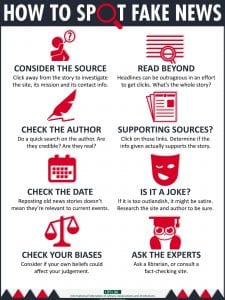Fake news. It’s a term that has always been thrown around but now it is a staple when describing information that we do not believe is true. However in the online world it is becoming increasingly impossible to weed out the fake news from the reliable. With the age of information comes these challenges but it’s all about making sure that the youth of today have those skill sets to make the connections of what is fact and with is fiction.
As Ryan Holmes states in his article a vast majority of people are getting their information off social media, which is this large uncurated space where people can post whatever they like. Having these technologies come with many positives however it is the people that use them that make the difference (Holmes, 2018, para.5). This way of life starts affecting nearly every type of information agencies as a whole. Within school libraries, these spaces need to be the forefront of educating the youth of today as valuable information literacy skills need to be embedded into school curriculums. This is happening with the Students Need School Libraries campaign which is making an impact right now. The value of a school library can make such an impact, children need to learn how to evaluate websites, build positive digital footprints and know how to use technology well (Students need school libraries, 2018, para.1). When these skills are being taught at a young age then they grow up with the skills to determine what information they can trust and what they can’t.
This puts a massive pressure on information professionals, as we must become the guardians of this knowledge. No longer are the days of just loaning books out, telling people to be quite and putting books back in Dewey Decimal order, we must be 3 steps ahead of the information game. Clayton Wehner outlines in their presentation that, yes books will always be a mainstay within libraries but the way the people are accessing content has changed dramatically (Wehner, 2017). And how do people develop these skills if they don’t have access to a library or a qualified librarian. Providing this access to people should be the most important thing of the next generation as these skills are vital and they will only be needed more as time and technology develop. Making sure people and children have the skills to weed out the fake news is an important trend that should be a focus of all librarians today.
Figure 1: How to spot fake news
References
Holmes, R. (2018). How libraries are reinventing themselves to fight fake news. Retrieved from https://www.forbes.com/sites/ryanholmes/2018/04/10/how-libraries-are-reinventing-themselves-to-fight-fake-news/#1708a41ffd16
IFLA. (2019). How to spot fake news. Retrieved from https://www.ifla.org/publications/node/11174
Students Need School Libraries. (2018). About us. Retrieved from https://studentsneedschoollibraries.org.au/about/
Wehner, C. (2017). The future of public libraries: from dusty tomes to disruptive technologies. Retrieved from https://bluetrainenterprises.com.au/blog/2017/09/18/future-public-library-disruptive-technologies/
